“Good comes from God’s grace, good comes from his gift”
The Pope's words at the Angelus
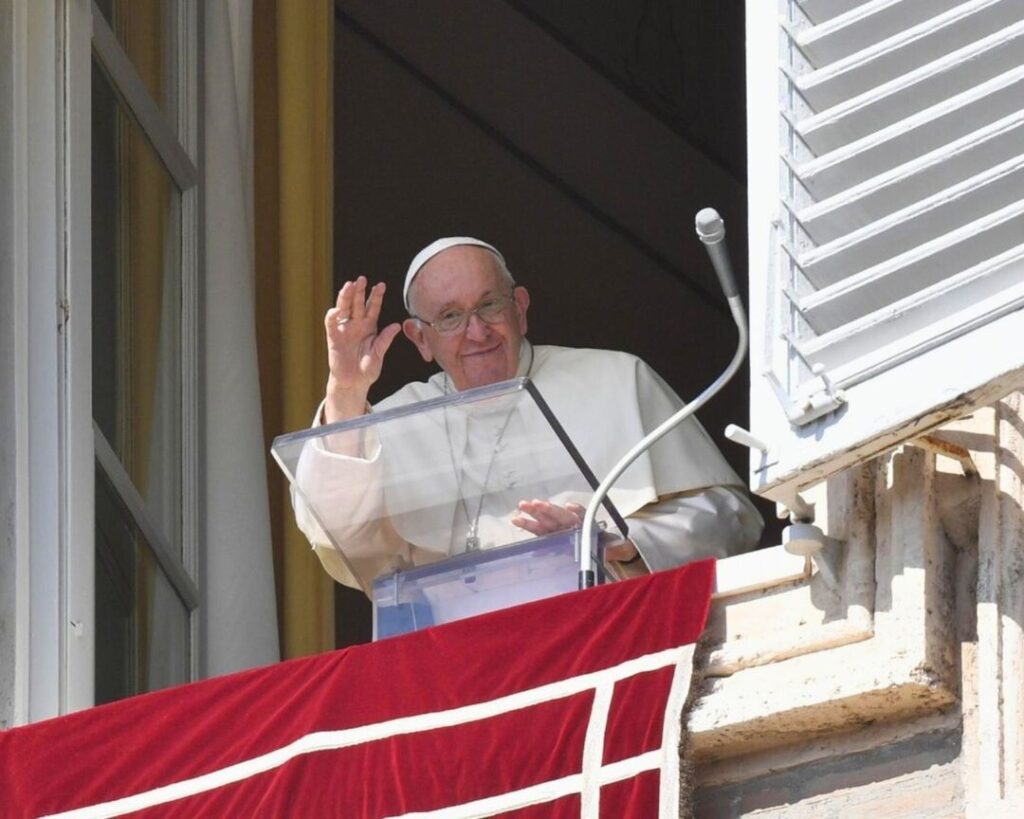
At 12 noon today, the Holy Father Francis looked out of the studio window in the Vatican Apostolic Palace to recite the Angelus with the faithful and pilgrims gathered in St. Peter’s Square.
These were the Pope’s words in introducing the Marian prayer:
Before the Angelus
Dear brothers and sisters, buongiorno!
Today, the Gospel presents us with a dramatic parable that has a sad ending (cf. Mt 21:33-43). A landowner planted a vineyard and took good care of it. Then, needing to go away, he entrusted it to some tenants. When vintage time drew near, he sent his servants to collect his harvest. But the tenants maltreated and killed them. So, the owner sent his son, and those tenants even killed him. How come? What went wrong? There is a message of Jesus in this parable.
The landowner did everything well, with love. He himself toiled to plant the vineyard; he surrounded it with a fence to protect it; dug a wine press, and built a watchtower (cf. v. 33). Then he entrusted his vineyard to some tenants, leasing his prized possession to them, thus treating them on an equal plane, so that his vineyard might be well cultivated and might bear fruit. Given these circumstances, the harvest should have come to a happy end, in a festive atmosphere, with a fair division of the produce to everyone’s satisfaction.
Instead, ungrateful and greedy thoughts insinuated themselves into the minds of the tenants. You see, at the root of conflicts there is always some ungratefulness and greedy sentiments to quickly take possession of things. “We do not need to give anything to the owner. The product of our work belongs to us alone. We need not give an account to anyone!” This is the discourse these labourers make. And this is not true: they should be grateful for what they received and for how they had been treated. Instead, ingratitude gave rise to greed and a progressive sense of rebellion grew within them, which led them to see the situation in a distorted way, to feel that the owner was in their debt rather than that they were in debt to the owner who had given them work. When they saw the son, they end up saying: “This is the heir. Come, let us kill him and have his inheritance!” (v. 38). And from being tenants, they become assassins. It is a whole process. And many times, this process takes place in the hearts of people, even in our hearts.
With this parable, Jesus reminds us what happens when a person deceives him/herself into thinking that he or she does things on their own, and they forget to be grateful, they forget the real basis of life: that good comes from the grace of God, that good comes from his free gift. When someone forgets this gratitude to God, he or she ends up no longer facing their own situation and their own limits with the joy of feeling loved and saved, but with the sad illusion of needing neither love nor salvation. That person stops letting him/herself be loved and finds him/herself a prisoner of their own greed, a prisoner to the need to have more than others, of the desire to stand out over others. This process is ugly, and many times it happens to us. Let us think seriously about this. This in turn gives rise to many dissatisfactions and recriminations, so many misunderstandings and so many feelings of envy; and, driven by resentment, the person can fall headlong into a spiral of violence. Yes, dear brothers and sisters, ungratefulness generates violence, it takes peace away, and makes us feel and yell when we speak, without peace, while a simple “thank you” can bring back peace!
So, let us ask ourselves: Am I aware that life and the faith are gifts I have received. Am I aware that I myself am a gift? Do I believe that everything comes from the grace of the Lord? Do I understand that, without merit, I am the beneficiary of these things, that I am loved and saved gratuitously? And above all, in response to grace, do I know how to say “thank you”? Do I know how to say “thanks”? The three phrases that are the secret of human coexistence: thanks, please, I’m sorry. Do I know how to say these three things? Thanks, please, I’m sorry, excuse me. Do I know how to pronounce these three phrases? It is a small word, “thanks” – “please” is a small word, two small words to ask for forgiveness, “I’m sorry” – is what God and our brothers and sisters expect every day. Let us ask ourselves if these small words, “thanks”, “please”, “pardon me, I’m sorry”, are present in our lives. Do I know to thank, to say “thanks”? Do I know how to excuse myself, to ask for forgiveness? Do I know how not to be invasive – “please”? Thank you, I’m sorry, please.
May Mary, whose soul glorifies the Lord, help us make gratitude the light that dawns daily in our hearts.
After the Angelus
I am following apprehensively and sorrowfully what is happening in Israel, where the violence has exploded even more ferociously, causing hundreds of deaths and casualties. I express my closeness to the families and victims. I am praying for them and for all who are living hours of terror and anguish. May the attacks and weaponry cease. Please! And let it be understood that terrorism and war do not lead to any resolutions, but only to the death and suffering from so many innocent people. War is a defeat! Every war is a defeat! Let us pray that there be peace in Israel and in Palestine.
In this month of October dedicated, in addition to the missions, to praying the Rosary, let us not tire of asking through Mary’s intercession for the gift of peace in the many countries throughout the world marked by war and conflicts. And let us continue to remember the dear Ukraine, which suffers so much every day, which is so battered.
I thank all those who are following, and who are above all accompanying by prayer, the Synod that is taking place, an ecclesial event of listening, sharing and fraternal communion in the Spirit. I invite everyone to entrust the proceedings to the Holy Spirit.
I greet all of you, people from Rome and pilgrims who come from Italy and from many parts of the world, in particular, the students and teachers from the Stigmatine Formation Center of Verona, and the Jesuits from various countries who are guests of the Saint Robert Bellarmine College of Rome. Many Polish people: I see many Polish flags here, to all of you… And to the people from the Immacolata.
I wish all of you a good Sunday and, please, do not forget to pray for me. Enjoy your lunch and arrivederci!
Related
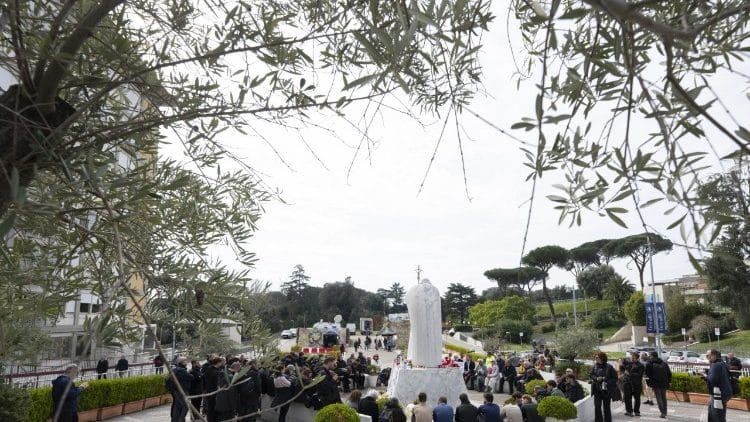
Pope at Gemelli Hospital: Peaceful Night
Exaudi Staff
12 March, 2025
1 min
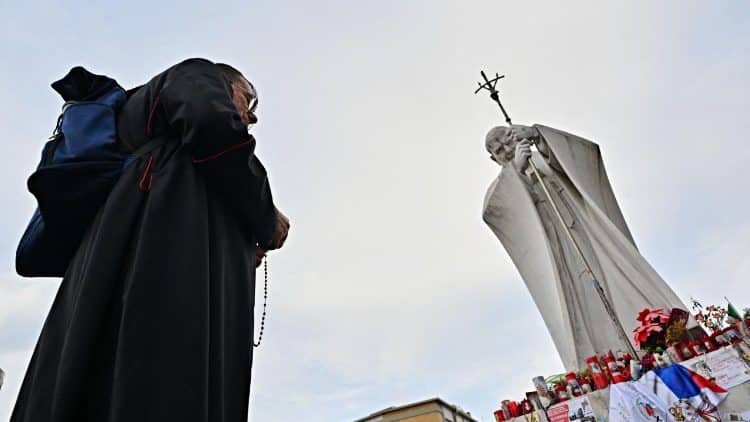
Pope at Gemelli Hospital: Slight Improvement
Exaudi Staff
11 March, 2025
1 min
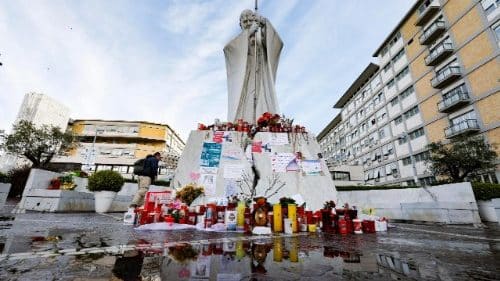
Pope Francis spent a peaceful night at the Gemelli Polyclinic
Exaudi Staff
11 March, 2025
1 min
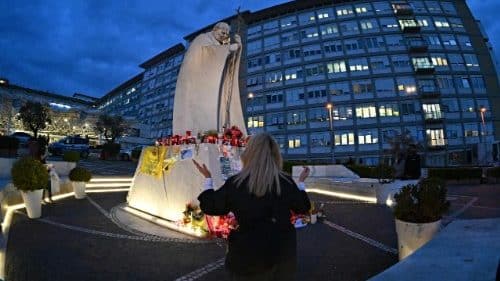
Pope Francis shows stable improvement
Exaudi Staff
10 March, 2025
1 min
 (EN)
(EN)
 (ES)
(ES)
 (IT)
(IT)

